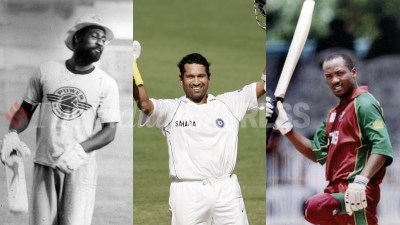Stay updated with the latest - Click here to follow us on Instagram
Detective under the microscope
As a probe into the ‘theft’ of confidential CDRs leads to arrest of seven private detectives, a look at the woman who was a pioneer in the trade and who finds herself in the middle of it
 Pandit (middle) was the fifth arrest in an expanding investigation into alleged theft of CDRs over 100 people. Express
Pandit (middle) was the fifth arrest in an expanding investigation into alleged theft of CDRs over 100 people. Express
It had been a much storied 40-year career up until that afternoon on February 2. Rajani Pandit, 64, widely acclaimed as Maharashtra and possibly India’s first private woman detective, had just begun her day sifting through files when she received a call from the Thane police, a close aide says. “Police came to her residence in Mumbai’s Shivaji Nagar and asked her to accompany them to the police station.”
By the end of the day, Pandit, who claims to have solved over 5,000 crimes, ranging from matrimonial disputes and kidnappings to murders, was behind bars. She was the fifth arrest in the Thane crime branch’s growing investigation into theft of call data records (CDRs) of over a hundred people, including that of some VIP numbers. Pandit had allegedly been obtaining the CDRs over a period of time, and police suspect she might have been using them for “extortion”. There have been seven arrests in the case so far, and police have widened the probe to Delhi, where they believe the leak originated.
The Thane police say they were led to Pandit by the arrest of four other private detectives, who had all allegedly been illegally obtaining CDRs. One of them had earlier worked for Pandit.
Disputing the charges, Pandit’s lawyer Madhav Thorat says that all she had was an email with CDRs of two numbers. “There is no proof she sought them. There are no victims in the case, and even people whose data the police are claiming was leaked, have not come forward. There is no case,” he says.
However, as Thane DCP (Crime) Abhishek Trimukhe points out, even possessing CDRs is a violation of the law. “It is confidential information; to have it is a crime under the IT Act. To have a role in retrieving the information is another crime, one which we will be able to prove as soon as the main leak of the documents is ascertained,” he says.
While it may now unravel, Pandit’s story is one of the most celebrated in the private eye business. It began in the late 1970s when Pandit, the daughter of a Mumbai Police inspector from the Virar suburb, was doing her BA in Marathi at Ruparel College. “One of her friends began avoiding people and stopped coming to classes. She began following her and soon realised that the friend had been lured into the flesh trade. She revealed the truth to the girl’s family,” recounts a journalist who interviewed her in 2006 and doesn’t want to be named.
Pandit assiduously built up a reputation of a private eye who relied on old school snooping techniques — going undercover, and following her targets around to catch them at their most vulnerable. “She is the quintessential Maharashtrian maushi, always clad in a cotton salwar-kameez. She is an utterly forgettable presence. You won’t look twice at her. It helped when she would go undercover,” says a former employee, requesting anonymity. “She has worked as a blind woman and as a house help. She believed that women could be good detectives as no one doubted or spotted them,” says a close aide. Vijayta Lalwani, who published what was to be Pandit’s last interview before her arrest, says she made her job her life. “She never even thought of starting a family herself,” Lalwani says.
Pandit’s family itself is close-knit. She, her brothers Vinod and Dilip, and mother Pramila, stay together in Shivaji Nagar. Sister Shobha Vaidya stays nearby. An aide says Pandit is extremely close to Shobha and her nephew, Marathi actor Aditya Vaidya. “They barely live a few kilometres from each other and attended events together,” says a source close to the family, adding that Aditya is now putting her defence together. In 1991, Pandit launched her own company, Rajani Pandit Detective Agency, from the same Shivaji Nagar residence. While in the beginning she operated alone, she later employed others, both men and women. On its website, the firm says it takes up cases ranging from pre-marital background checks and post-marital checks to family disputes and kidnappings and murders.
It was only in the recent years that she switched to more tech-savvy surveillance. “Crimes and criminals have not remained simple. Even when people are cheating on their spouses, they generally take precautions and cover their tracks. TV shows and novels have made them aware of the number of ways in which they can get caught,” explains a detective based out of Navi Mumbai.
“It is plausible that Pandit upped her game too. She had employed many young people. She might have started using technology too,” he adds. With her fame growing, Pandit is also believed to have inspired popular culture. “The movie Bobby Jasoos in which Vidya Balan plays the lead is inspired by Pandit. Another movie (Tamil film Kuttrappayirchi) is coming up on her life,” says her lawyer Thorat.
Pandit’s work was also the subject of the documentary Lady James Bond, that saw a limited release. Pandit has herself written two Marathi books, Mayajaal and Faces Behind Faces, both claimed to be fictionalised accounts of cases she has handled. “She was never secretive about her work. She would happily explain her solved cases,” says a source close to Pandit.
Police believe that having been in the business for nearly four decades, Pandit took a leaf out of their own investigation process to obtain the CDRs. “She is a policeman’s daughter after all. She knows how the police gather proof. It isn’t very far-fetched to think that she is aware of the benefits of the CDRs and how these can be obtained,” says an officer with the Thane police.
The Thane crime branch also believes she is letting on less than she knows. “She is a senior detective with multiple connections. We are trying to identify all those who helped her get her hands on the CDRs. She had deleted her WhatsApp data and the audio-video files we seized from her house are hours long. We need to question her more,” says DCP Trimukhe, who is investigating the case.
Her lawyer Thorat, however, insists she is not as technologically advanced as she is being made out to be. “She uses her phone to only receive and make calls,” he says. He also makes a case for her citing her age. “She has been suffering from diabetes and hypertension for years now. She even has mild insomnia. We shall hopefully be able to secure bail.”







